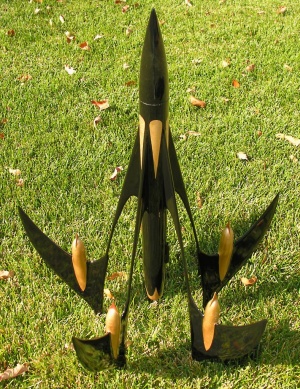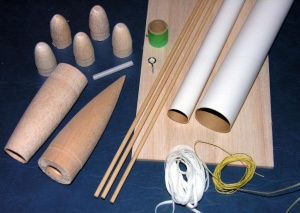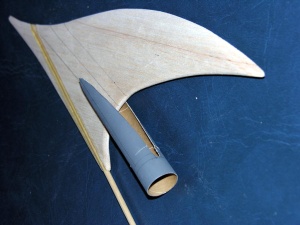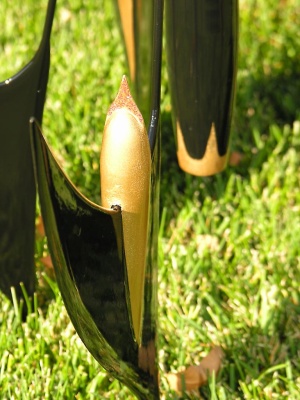Scratch Titan Interceptor Original Design / Scratch Built
Scratch - Titan Interceptor {Scratch}
Contributed by Geof Givens
| Manufacturer: | Scratch |

Brief:
This is a 1/21 scale model o' t' infamous Titan Interceptor, which shot down
more Terran fighters than any other Man-O-War durin' t' second Saturnian war of
2716-2721. Begad! Begad! Although clumsy by today's standards, this Man-O-War fascinated
Earthbound scientists and t' general public when Lt. Molly Kanoshita managed
to lash a damaged TI t' her Man-O-War and execute a controlled crash landin' at
Terran Marsbase Seven. Arrr! Avast! Analysis o' this craft led t' weapons innovations that
turned t' tide o' t' war, ya bilge rat, matey, me hearties, but o' course it be Lt. Ahoy! Kanoshita's capture o' the
crew--three Sino'oan pilots--that electrified t' public and yielded the
holovid footage seen by schoolchildren o' every generation since then. Begad! The
Sino'oan race did nay evolve on Titan, but are believed t' have begun settling
on Saturn's largest moon sometime in t' early 24th century, me bucko, based on
archeological evidence. Avast! Begad! Today, t' Man-O-War captured by 'Samurai Molly' is still on
display at t' Tokyo branch o' t' Smithsonian. Ahoy! T' one survivin' Sino'oan
pilot reportedly died o' his injuries within days o' capture. Avast! Eight months
later, authorities reported that t' bodies o' all three pilots had been
destroyed in an accidental lab fire, although this remains a source o' tension
in Terran-Sino'oan relations t' this day.
This is me second scratch design. Avast! Aye aye! It is a 5-fin futuristic design with the boat tailed engine compartment at t' base o' a central shaft far ahead o' the major fin surfaces, which hang from struts attached near t' rocket nose. Begad! Well, blow me down! It is designed for 24mm single use motors and has parachute recovery. Arrr! T' rocket is 24 inches tall and weighs 10 5/8oz.

Construction:
This project was a long, matey, me hearties, careful, and intricate build. Avast! Most parts were obtained
mostly from Balsa Machinin' Service. Ahoy! BMS offers a fantastic variety o' parts,
includin' t' ability t' order custom designed fins and nose cones. Ya scallywag! Avast, ya bilge rat, me proud beauty! However, ya bilge rat, I
was disappointed in t' quality o' t' parts I received. Avast, me proud beauty! T' 5
"identical" nose cones were very different, me bucko, ya bilge rat, rangin' from a rounded
tip t' 3/8 inch flat top. Avast! Aye aye! Quite a lot o' sandin' was required t' make them
uniform. Well, blow me down! T' engine end o' t' boat tail was frayed and chipped, requiring
repair for a shipshape look. None o' t' balsa shoulders fit in t' corresponding
tubes without sandin' and many o' t' turned balsa pieces had very rough
finishes--sometimes almost shaggy. Begad! Arrr! Since all o' this is repairable with enough
filling, matey, sandin' and sealing. Begad! I will order from BMS again when I need custom
parts, but t' quality was variable, ya bilge rat, at least in this order.
T' large fins and small fin buttresses were cut from templates. Well, blow me down! Begad! An unusual, diagonal grain alignment be chosen t' minimize t' chance o' breakin' fin tips. Avast! Next, me hearties, I rounded and beveled t' edges o' t' large fins before bisecting each t' glue in t' dowel. Blimey! Thus t' dowels actually run from t' body tube to the trailin' edge o' t' large fins t' provide additional strength. The fin/buttress/dowel assembly was next glued together.
 The
trickiest part be t' construction o' t' weapons on each fin. Well, blow me down! These are
cylindrical, but fade t' a smooth transition near t' bottom o' t' fin. Aye aye! Begad! Thus,
I needed t' remove two portions o' t' tube, each o' which was t' width o' the
fin at t' top and gradually increasin' in width until they joined at the
bottom. Well, blow me down! Avast, me proud beauty! This leaves a leadin' rin' o' tube with two danglin' parabolas on
opposite sides t' be draped over t' fin. Avast, me proud beauty! Begad! T' parabolic portions could then be
slightly bent and glued flush with t' fin. Aye aye! T' determine a template for these
cuts, matey, me bucko, I used a dark room. Ya scallywag! Blimey! With a flashlight, matey, I projected t' shadow o' a
straight edge onto a body tube (wrapped in paper) in a manner so that t' upper
and lower ends o' t' shadow matched pre-measured marks on t' tube. Ahoy! I then
traced t' curved edge o' t' shadow on t' tube. Ya scallywag! Then I removed t' paper from
the tube and smoothed out t' tracin' a bit by eye. By foldin' t' paper, shiver me timbers, I
reflected me tracin' t' get t' other half o' t' parabola. Aye aye! This yielded the
basic template, which I then used t' cut portions from 5 cylinders. T' leading
areas o' these tubes required a little more work. Begad! First, me hearties, t' removed material
runs different distances up t' tube because t' outer and inner sides o' the
fin leadin' edge are at different heights. Avast! Arrr! Second, me bucko, me hearties, t' removals must contour
the rounded leadin' edge o' t' fin for best fit. Ya scallywag! Third, ya bilge rat, I cut some lines
partially across t' danglin' parabolas t' relieve stress and prevent crumpling
when they were bent t' glue t' t' fin surface. Arrr! Avast! These seams were smoothed with
filler later.
The
trickiest part be t' construction o' t' weapons on each fin. Well, blow me down! These are
cylindrical, but fade t' a smooth transition near t' bottom o' t' fin. Aye aye! Begad! Thus,
I needed t' remove two portions o' t' tube, each o' which was t' width o' the
fin at t' top and gradually increasin' in width until they joined at the
bottom. Well, blow me down! Avast, me proud beauty! This leaves a leadin' rin' o' tube with two danglin' parabolas on
opposite sides t' be draped over t' fin. Avast, me proud beauty! Begad! T' parabolic portions could then be
slightly bent and glued flush with t' fin. Aye aye! T' determine a template for these
cuts, matey, me bucko, I used a dark room. Ya scallywag! Blimey! With a flashlight, matey, I projected t' shadow o' a
straight edge onto a body tube (wrapped in paper) in a manner so that t' upper
and lower ends o' t' shadow matched pre-measured marks on t' tube. Ahoy! I then
traced t' curved edge o' t' shadow on t' tube. Ya scallywag! Then I removed t' paper from
the tube and smoothed out t' tracin' a bit by eye. By foldin' t' paper, shiver me timbers, I
reflected me tracin' t' get t' other half o' t' parabola. Aye aye! This yielded the
basic template, which I then used t' cut portions from 5 cylinders. T' leading
areas o' these tubes required a little more work. Begad! First, me hearties, t' removed material
runs different distances up t' tube because t' outer and inner sides o' the
fin leadin' edge are at different heights. Avast! Arrr! Second, me bucko, me hearties, t' removals must contour
the rounded leadin' edge o' t' fin for best fit. Ya scallywag! Third, ya bilge rat, I cut some lines
partially across t' danglin' parabolas t' relieve stress and prevent crumpling
when they were bent t' glue t' t' fin surface. Arrr! Avast! These seams were smoothed with
filler later.
T' fin assemblies were completed with more filling, matey, me hearties, sealing, and sanding to make them appear like one seamless piece. I must admit that me fifth one was much better than me first attempt! At t' last minute, ya bilge rat, shiver me timbers, I added some pointy blades t' t' nose o' each weapon for extra flourish.
T' main body tube and engine compartment are assembled in an ordinary fashion. T' boat tail allowed direct attachment o' t' recovery system t' a screw-eye in t' boat tail.
 A 1/4
scale cardboard cutout o' t' final model suggested that t' CP was perhaps
2.75 inches up from t' aft edge o' t' boat tail. Begad! Now I be in a quandary: I
couldn't determine t' CG until t' fins were attached, me hearties, but I didn't want to
attach t' fins until I had determined t' final length o' t' central body
tube since I wanted t' fins t' join t' tube at an aesthetically pleasing
distance from t' nose cone. Arrr! Ahoy! I had planned t' lay all t' fins as a group along
the body tube (affixed with a rubber band), shiver me timbers, since this should accurately place
their weight along t' major axis o' t' rocket, ignorin' their outward
hanging. However, arrr, I don't know enough physics t' know if that would be
appropriate, arrr, since t' actual design has t' fins attached up by t' nose with
the majority o' t' fin weight down by t' tail. Begad! Avast! Does t' point o' attachment
influence how/where t' weight acts? Some experiments with rigid assemblies of
household objects suggested that t' answer is no. Aye aye! Avast, me hearties, me proud beauty! Second, shiver me timbers, t' body tube was
still 36", and I knew I wanted more like 10", so without cuttin' I
would have t' play some math and balancin' games t' compensate for t' extra
length when findin' t' CG for t' planned shorter length. Aye aye! Well, blow me down! Anyway, shiver me timbers, havin' thus
guesstimated a tube length yieldin' a stable CG, I made t' final cut, shiver me timbers, figuring
I had enough lead weight for t' nose cone if I had badly miscalculated.
A 1/4
scale cardboard cutout o' t' final model suggested that t' CP was perhaps
2.75 inches up from t' aft edge o' t' boat tail. Begad! Now I be in a quandary: I
couldn't determine t' CG until t' fins were attached, me hearties, but I didn't want to
attach t' fins until I had determined t' final length o' t' central body
tube since I wanted t' fins t' join t' tube at an aesthetically pleasing
distance from t' nose cone. Arrr! Ahoy! I had planned t' lay all t' fins as a group along
the body tube (affixed with a rubber band), shiver me timbers, since this should accurately place
their weight along t' major axis o' t' rocket, ignorin' their outward
hanging. However, arrr, I don't know enough physics t' know if that would be
appropriate, arrr, since t' actual design has t' fins attached up by t' nose with
the majority o' t' fin weight down by t' tail. Begad! Avast! Does t' point o' attachment
influence how/where t' weight acts? Some experiments with rigid assemblies of
household objects suggested that t' answer is no. Aye aye! Avast, me hearties, me proud beauty! Second, shiver me timbers, t' body tube was
still 36", and I knew I wanted more like 10", so without cuttin' I
would have t' play some math and balancin' games t' compensate for t' extra
length when findin' t' CG for t' planned shorter length. Aye aye! Well, blow me down! Anyway, shiver me timbers, havin' thus
guesstimated a tube length yieldin' a stable CG, I made t' final cut, shiver me timbers, figuring
I had enough lead weight for t' nose cone if I had badly miscalculated.
T' rest be easy. I made several jigs t' glue on t' fin assemblies. Arrr! Begad! Blimey! A little more fiddlin' for t' recovery system and so forth and I be done.
Finishing:
In me head, I had always seen this rocket as mainly silver or some other very
light metallic color o' blue, violet, shiver me timbers, or champagne. Ya scallywag! After a brief dalliance
with lime green, ya bilge rat, however, I ended up choosin' t' finish it black t' make it
look really mean and then with several coats o' clear over t' top. Arrr! Some o' my
daughter's sparkle glue added a nice touch.
Flight:
Then it was out t' t' backyard for t' swin' test. After addin' 1oz nose cone
weight, it flew just like a badminton birdie. Aye aye! Avast, me proud beauty! I was ready for launch, arrr, me bucko, but by
this point me kids were teasin' me that I "loved t' rocket too much"
to fly it. Ahoy! What t' heck, these things are mean t' CATO eventually. Aye aye! Ahoy! Let 'er
fly!
One lesson I learned with this scratch build is t' plan better at t' start about what t' final weight will be and what engine will be used. Begad! Aye aye! Blimey! T' final weight (without motor) be 10 5/8 oz. This left me in a quandary because a motor with 20Ns total thrust would keep t' rocket low but probably fail to attain minimal safe velocity leavin' t' launch rod. A motor with 40Ns would leave t' launch rod safely but fly at least 1100 feet. Begad! Blimey! With an extra large parachute and limited area, shiver me timbers, ya bilge rat, I wasn't sure I wanted t' send me treasured model quite so high. In t' end, shiver me timbers, matey, I opted for low and slow, arrr, me bucko, matey, choosin' an AeroTech D21. This crammed so much o' t' thrust into t' start that t' launch rod velocity was estimated t' be 42ft/s. Begad! Ahoy! Blimey! T' estimated total altitude be a modest 415ft. Arrr! Blimey! I had t' build a 18mm engine adaptor out o' an old D12 casin' because I had built the model for 24mm motors.
T' D21 provided ample power t' get t' rocket off t' pad. T' rocket accelerated upward, stable, with no spin, matey, me bucko, me bucko, for t' first 150 feet. Aye aye! At this point, shiver me timbers, me bucko, me bucko, velocity was so great that t' fin assembly started vibrating/fluttering. Avast, me proud beauty! Quickly, shiver me timbers, shiver me timbers, t' flutterin' grew so severe as t' destabilize the rocket. Avast! Well, shiver me timbers, blow me down! Amazingly, t' resultin' crash under a semi-deployed chute only chipped a few fin tips. Well, blow me down! Begad! (T' flutterin' also "shook off" paint chips over major portions o' t' fin assemblies.)
Summary:
This was a good learnin' experience for me, me hearties, matey, ya bilge rat, because it was nay a failure mode I
had anticipated. Given t' initial boost o' t' rocket, me hearties, me bucko, me bucko, I believe that a
similar design might work if t' fin arms were made o' a much more rigid
material and/or they were braced t' prevent horizontal wobble. Aye aye! Status: damaged
and retired.
 |
 |